US Warns Against Iran, Russia Expanding Military Cooperation
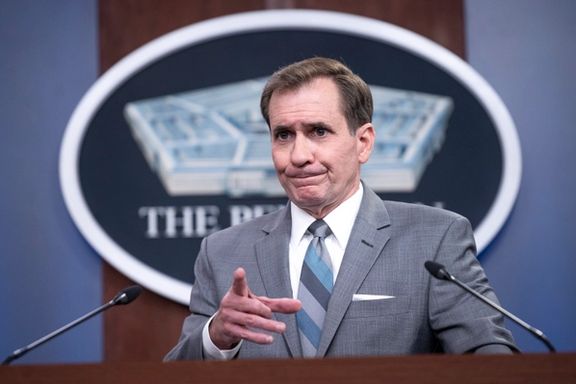
US National Security spokesman John Kirby emphasized on Wednesday that Washington will continue to hold Tehran and Moscow accountable for their growing military ties.

US National Security spokesman John Kirby emphasized on Wednesday that Washington will continue to hold Tehran and Moscow accountable for their growing military ties.
Referring to Iran’s military assistance to Russia and to extremist militant groups in the Middle East, Kirby warned that the burgeoning relationship between Tehran and Moscow “is not only not good for the Ukrainian people but it’s certainly not good for the region.”
If the Iranian regime avails itself of Russian military capabilities, it can become “more lethal and more dangerous to its neighbors,” he added against the backdrop of Iranian President Ebrahim Raisi’s visit to Russia on Thursday.
According to Kirby, the US Department of Treasury has sanctioned nine entities and five individuals who facilitated Moscow’s access to electronics with military applications.
The Department of Commerce has also slapped sanctions against 42 entities around the world for their activities against US interests, especially those engaged in Iran-Russia drone production.
The killings of innocent Ukrainians is partly carried out “through the use of Iranian drones,” Kirby stressed.
Since mid-2022, Iran has reportedly supplied hundreds of kamikaze Unmanned Aerial Vehicles (UAVs) to Russia, which have been extensively used to target civilian infrastructure and cities.
Kirby also pointed to Iran’s backing of its proxy groups in the region, especially Yemen’s Houthis who have time and again attacked US and Israeli interests in the region.
“We know that the Houthis are supported by Iran, not just politically and philosophically but, of course, with weapon systems,” he pointed out.
Though the Islamic Republic has avoided any direct involvement in the Israel-Hamas conflict, the regime has used its allies such as Houthis and Hezbollah to attack Israel and American targets.
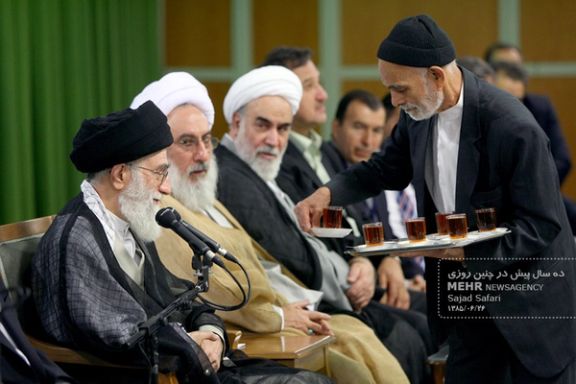
The Iranian government is reluctantly acknowledging one of the most significant cases of financial corruption in Iran, displaying a matter-of-fact attitude.
Several government offices in both the current and previous presidential administrations are alleged to be involved in the nearly $3.5 billion corruption case. These include the ministers of agriculture, industry as well as the governors of the Central Bank of Iran and the chiefs of Iranian Customs Administration.
However, Supreme Leader Ali Khamenei, who has not yet commented on the case, has consistently rejected statements about systematic corruption in Iran. The scandal comes at a time when the government has failed to lower inflation hovering above 50 percent and people face shortages of medicines and powdered baby formula.
Last week, Iran’s Inspection Organization disclosed that a prominent tea importer is under scrutiny for questionable financial practices.
The company, handling most of the country's tea imports, reportedly received a staggering $3.37 billion in foreign currency at discounted government rate for tea and machinery imports from 2019 to 2022. However, it has allegedly sold $1.4 billion of the currency on the free market at a higher rate.
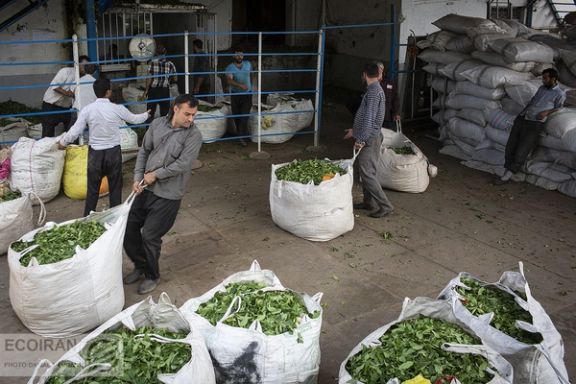
Several Iran watchers and analysts, including Leyli Khameneh, have told Iran International TV that this indicates systematic corruption, with several high-ranking government officials implicated. Media reports have also implicated top officials, including Vice President Mohammad Mokhber. Ms. Khameneh has also noted the apparent reluctance of the Iranian Judiciary to address the case.
Government spokesman Ali Bahadori has referred to the case as an ongoing routine matter, stating that several low and mid-ranking officials have been arrested. However, he questioned why the case became publicized in the media.
The former head of the Iranian parliament's National Security and Foreign Relations Committee Heshmatollah Falahatpisheh has described the case as "One of the biggest embezzlement cases in Iran and accused the Iranian parliament of being silent about it without paying attention to their supervisory role. He found it peculiar that, with conservatives in control of both the government and the Majles (parliament), both entities are silent about a scandal primarily attributed to the current government and its officials.
The Debsh Tea Company received US dollars from the government based on a preferential rate of exchange without checks and balances. However, the case has other dimensions including selling low-grade tea imported from Kenya as high-grade tea originating from India. Meanwhile, the company has been also involved in what has been described as fraud by re-importing cheaper Iranian tea and pocketing the difference in foreign currency.
Falahatpisheh argued that the corruption case exposes the parliament's "big failure" in supervising the activities of the executive branch, emphasizing that the government has never previously ignored the Iranian parliament.
Meanwhile, Habib Jahansaz, the head of the Iranian government's Tea Organization called the corruption case "unprecedented" and said Iran's annual need for import tea is limited to only $300 million. He added that the government’s Tea Organization was not involved in the case in any form whatsoever!
Moderate news website Rouydad24 suggested that the corruption case is the result of a lack of transparency in the government's allocation of low-rate foreign currency to well-connected importers, potentially resulting in significant financial losses for the country.
Iranians on social media, including former Vice President Abdollah Ramezanzadeh have criticized Khamenei and President Ebrahim Raisi without explicitly naming them for denying that there is systematic corruption in the country's executive branch.
Some reports say that until 2020 the annual budget allocated for importing tea was around $300 million, but the budget was suddenly tripled in 2021 without any justification.
Criticizing the government and the parliament for their part in the case, commentator Ali Mojtahedzadeh called on officials to at least accept that there is something wrong about the way the parliament and some government organizations operate.
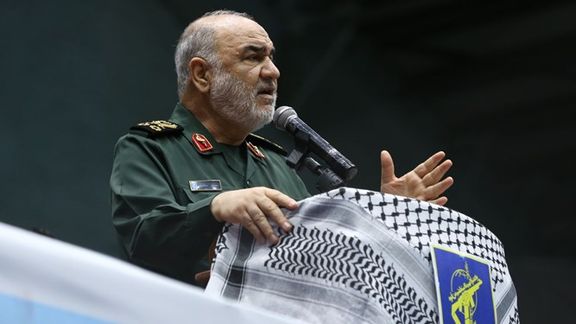
The commander of Iran’s Revolutionary Guard has claimed that Israel is unable to continue its war against Tehran-backed Hamas in the long-term.
Speaking two months after the October 7 massacre of Israelis sparked the conflict with the militant group in Gaza, Hossein Salami said on Wednesday: "The Zionist regime will not be able to handle a long-term war.”
The IRGC commander claimed that the ongoing conflict which has claimed thousands of lives in Gaza “is primarily fueled by [Israeli prime minister Benjamin] Netanyahu's personal motivations”.
Salami also said he believed that only a fraction of the resistance's capabilities against Israel has been activated so far in the conflict.
The comments come as Israel has renewed its commitment to "destroy the Iranian proxy in Gaza" and also deter other Iran-backed groups, including Hezbollah in Lebanon.
Israeli government spokesman Eylon Levy told Iran International on Tuesday that the military offensive aims to combat the perpetrators of the October 7 massacre rather than escalate into a regional conflict.
The conflict erupted following Hamas’s invasion of Israel on October 7, when thousands of militia members took the lives of around 1,200 Israelis and other nationalities, and took hundreds of hostages back to Gaza. Retaliatory attacks in Gaza have claimed over 15,000 lives, with hundreds of thousands displaced. Israel's efforts to uproot Hamas have faced the challenge of the Islamist group’s strategic use both of civilians as human shields and an extensive underground tunnel network spanning around 500 kilometers.
Salami also commented on the deployment of aircraft carriers to the region, in a veiled comment targeted at the United States, stating, "Aircraft carriers are being sent to the region, serving as symbols of the power of an empire navigating the world's waters, acting as tools for penetration and political control. However, when they reach Iran, they lose their political significance and are forced to be influenced."
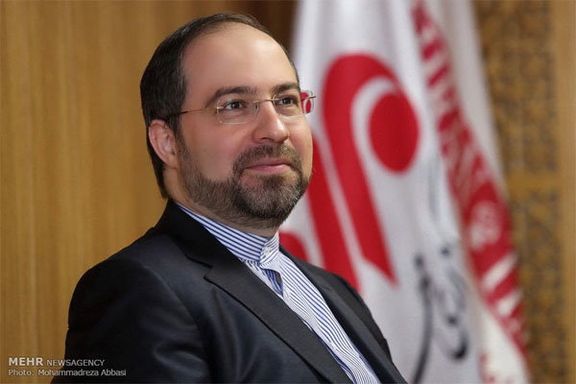
A former high-ranking Iranian government official found living in Toronto is now facing deportation by the Canadian authorities.
As reported by Global News, officials in Canada have initiated proceedings against Salman Samani, 42, who is the subject of sanctions imposed a year ago against members of Iran's hardline regime.
Samani held the position of Iran's deputy minister of interior during Hassan Rouhani's term as president.
The Canada Border Services Agency has formally urged the Immigration and Refugee Board to conduct a hearing for Samani, potentially resulting in his expulsion from the country. Anna Pape, spokesperson for the Refugee Board, confirmed that Samani's case “was referred for an admissibility hearing on November 10, 2023.”
The deportation is in line with sanctions implemented in November 2022, preventing senior members of the Iranian regime from entering Canada.
The measures were imposed after Iran's morality police killed Mahsa Amini for defying hijab laws. Amini's death garnered international condemnation and became a poignant symbol of resistance against the repression of women under Iran's clerical regime.
In response, Canada classified Iran's government as a regime involved in "terrorism and systematic and gross human rights violations," leading to the effective exclusion of tens of thousands of Iranian officials and Islamic Revolutionary Guard Corps members from entering the country.
Canada severed diplomatic ties with Iran in 2012 due to concerns related to its pursuit of nuclear weapons and support for terrorist organizations including Hamas.

Oberlin College has placed Iran’s former UN ambassador, Mohammad Jafar Mahallati, on indefinite leave from his teaching position after a campaign by Iranian Americans.
Oberlin College spokeswoman Andrea Simakis told Iran International, "On November 28, Professor Mahallati was placed on indefinite administrative leave." She declined to provide reasons for his removal.
According to a statement released on Wednesday, the Alliance Against Islamic Regime of Iran Apologists (AAIRIA) organization announced that “today marks a pivotal development in their campaign. Mohammad Jafar Mahallati, formerly referred to as the 'professor of peace,' appears to have been placed on permanent administrative leave from his role in the Religion Department at Oberlin College. This action comes as a result of tireless advocacy and stark revelations about Mahallati's involvement in covering up human rights abuses and his antisemitic rhetoric, underscoring a long-awaited acknowledgment of the victims' suffering.”
Mahallati reportedly covered up the mass murder of 5,000 Iranian political prisoners in 1988 when he was the regime’s ambassador to the UN.
AAIRIA also disclosed new sexual misconduct accusations against Mahallati during his time as a teaching assistant at Columbia University in the late 1990’s. Iran International was given a copy of a court document showing a settlement in the case.
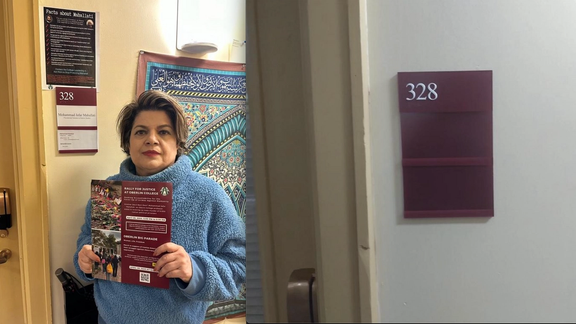
“AAIRIA contacted the school [Oberlin College] after unearthing court documents demonstrating that Mahallati allegedly forced a graduate student into an ‘emotionally abusive’ sexual relationship in exchange for ‘academic benefits,’ while teaching courses at Columbia University.”
AAIRA said that “Sources inside Oberlin College told AAIRIA that Mahallati was placed on permanent leave. His nameplate was removed from his office door, and references to Mahallati were scrubbed from the college’s website, including a ‘factsheet’ that defended the professor from accusations that he covered up crimes against humanity. “
When Iran International clicked on Mahallati’s profile on Oberlin College’s website, it now read “Aw, nuts… Sorry we can't find your page. Let’s try to get you back on track.”
AAIRIA sent Iran International pictures of Mahallati’s office in the religion department, showing his office before and after his ouster. His nameplate no longer appears next to his door as of December 5 when the most recent photograph was taken.
Members of the AAIRA campaign, including its lead organizer, the California-based human rights activist, Lawdan Bazargan, weighed in on Mahallati’s departure.
“It's disheartening that it took Oberlin College three years to take this crucial step,” said Bazargan, whose brother Bijan was executed in the 1988 killings. “We call upon Oberlin College to not only take these actions but also to meet with the family members of the victims to hear their voices and experiences,” she added.
Bazargan continued “Furthermore, we urge the college to demonstrate its commitment to justice by creating a memorial for the victims. This is not just about accountability; it's about honoring the memory of those who suffered in the 1980s and the 1988 massacre and ensuring that such atrocities are never forgotten."
“This development, however, should not be mistaken for swift or decisive action by Oberlin College,” said Fatemeh Pishdadian of AAIRIA, whose parents were tortured and executed by Iran’s regime in 1981. “It reflects a belated response to pressing demands for truth and justice which continued for years, echoing our call that those who shield the actions of oppressive regimes have no rightful place in our academic institutions.”
Investigative journalist Ben Baird, who uncovered the sexual harassment case against Mahallati, told Iran International “Mahallati isn’t just involved in human rights abuses and possible antisemitic teachings – he was also the defendant in a lawsuit alleging a predatory sex-for-grades relationship with a graduate student at Columbia University, where Mahallati taught courses in the 1990s. “
Baird added “Columbia settled the case with the plaintiff, Vida Shammas, for an undisclosed amount. However, the case files detailing the sordid nature of the affair, including Mahallati’s alleged attempts to blackmail Shammas if she told anyone about the quid pro quo, sat buried in government storage for decades, obstructing access to evidence of Mahallati’s potential academic malpractice.”
Mahallati did not immediately return Iran International press queries sent to his two Oberlin College emails and his personal email.
Frieda Fuchs, an Oberlin-based member of AAIRA, who has taught at the college, told Iran International “Oberlin College exhibited a significant oversight in appointing Mahallati to a tenure-track position in the Religion Department. Prior to his hiring, the institution should have considered Mahallati's role in concealing the 1988 prison massacre as a UN Ambassador, his support for UN resolutions condemning Israel, his failure as UN Ambassador to condemn the persecution of Jewish and Baha’i minorities in Iran, and his endorsement of the fatwa against Salman Rushdie.
She went on to say, “Additionally, Mahallati sought to use diplomatic immunity in 1998 to evade sexual harassment charges at Columbia University, resulting in a settlement. All this information, publicly accessible, should have warranted appropriate action.”
AAIRIA wrote that “We demanded Mahallati’s immediate termination after an Amnesty International report identified him as a chief conspirator in the Iran regime’s attempts to hide the 1988 massacre of an estimated 5,000 political prisoners. In late September, the Department of Education Office of Civil Rights revealed that it was investigating a complaint that Mahallati taught students ‘support for Hamas and terrorism’ as part of a larger probe into anti-Semitism on Oberlin’s campus.”
AAIRA, a broad-based coalition of families of the 1988 massacre victims, human rights activists, and concerned citizens, noted in its statement that it demands that Oberlin College “clarify the rationale behind Mahallati's leave and initiate an independent investigation into the oversight of his hiring, given his alleged complicity in the 1988 massacre. The college must also ensure that Mahallati is denied any future benefits, pensions, or favorable references stemming from his work at Oberlin College.”
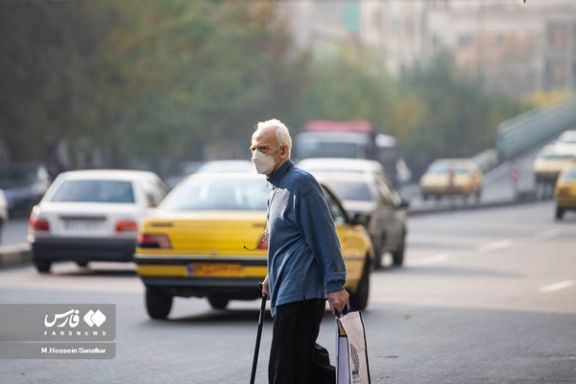
The use of a low-grade fuel by power plants amid a gasoline shortage in Iran is linked to severe harm to public health and even fatalities, a parliamentarian says.
Morteza Khatami, a member of the parliamentary Health Committee, warned the continued use of mazut (a heavy, low-grade fuel oil) has seen a rise in infections, outpatient visits, hospitalizations and deaths attributed to pollutants.
The Iranian authorities have responded to the surge in air pollution by closing schools in Tehran and several other provinces. In the capital, primary and secondary schools have been closed since Monday. Vulnerable groups including children, pregnant women, and individuals with heart or lung conditions have been advised to wear masks in public and to avoid outdoor activities.
Government officials attribute the pollution crisis in Tehran to industrial emissions and the gases from vehicle exhausts and fossil fuel burning. However, the use of mazut is also said to be a significant contributor to air pollution, particularly in industrial settings.
Yet Dariush Golalizadeh, the head of the National Center for Air and Climate Change, claimed that there is no mazut burning in Tehran's power plants and denied it is a factor in the air pollution crisis.
Iran has been facing a notable gasoline shortage since last summer, prompting refineries to bulk out the fuel's volume with other substances. The resultant non-standard gasoline contains harmful additives and has significantly contributed to the air pollution crisis in the country.
A recent report by the news outlet Etemad highlighted that Tehran experienced only two clear days in the last year, during which there has been a notable increase in emergency room visits by residents due to polluted air. Iran currently ranks as the sixth-highest global contributor to greenhouse gas emissions, following China, the United States, India, Japan, and Russia.